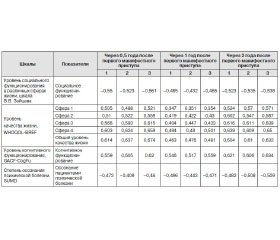Международный неврологический журнал 5 (75) 2015
Вернуться к номеру
The possibility of medication and psychotherapy in potentiation of remission in patients with early stages of schizophrenia
Авторы: O.I. Osokina - M. Horky Donetsk national medical university, Krasny Liman, Donetsk region, Ukraine
Рубрики: Неврология
Разделы: Справочник специалиста
Версия для печати
The criteria for clinical remission, which are used for patients with schizophrenia at present have lack of those criteria that reflect social adaptation of patients, level of their functioning in society and the level of their existential and personal recovery. Therefore, great attention is paid to medical relief of psychotic episode, and insufficient attention is paid to quality psychotherapeutic rehabilitation of patients with the early stages of schizophrenia. The aim of this study is to evaluate the effectiveness of complex treatment in schizophrenia patients that included medication and psychotherapeutic rehabilitation system developed by the author. The research based on the results of clinical, psychological, social study and anamnestic data which were carried out at the beginning of the treatment and in two-years period from the date of schizophrenia manifestation.
There is conducted a comprehensive study of 237 patients with first-episode schizophrenia and presented the results of outcomes for the period of two years, including clinical, social and personal aspects. It was carried out a comparative analysis of outcomes in groups of schizophrenia patients. Of the total 237 patients, 122 of them have been involved in an integrated program of treatment (they received medical therapy and psychotherapeutic rehabilitation), the remaining 115 patients were included in the standard treatment (they received only medication). Complex treatment included medication and psychotherapeutic rehabilitation system. It was detected positive correlations between higher level of patient's social functioning, quality of life, cognitive functioning, a degree of awareness of mental illness by patients and favorable clinical and social outcomes of schizophrenia. Significant predictors of two-year clinical outcomes are founded by constructing multifactorial mathematical models. Among them the duration of untreated illness, depth of expression prodromal symptoms, patient's clinical status after the relief of acute productive symptoms, especially of the medical and rehabilitation tactics, the level of awareness of mental illness and patient's quality of life and. As a result, the mathematical model could predict in advance the possible options for the outcome of schizophrenia in the case of integrated treatment or standard treatment.
When standardization for all significant risk factors the application of the comprehensive treatment reduced the risk of adverse outcome (p<0,001), OR=0.17 (95% CI 0,06–0,45) in two-year period. There is presented clinical case which is demonstrated a change in disease prognosis depending on the use of standard or complex treatment.
Overall, the study shows that the patients, who received integrated treatment, had more favorable schizophrenia outcomes during 2 years after the manifestation of the disease.

